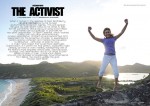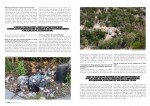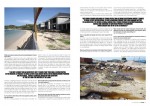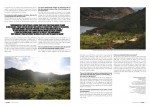Pure 7, 2010/2011
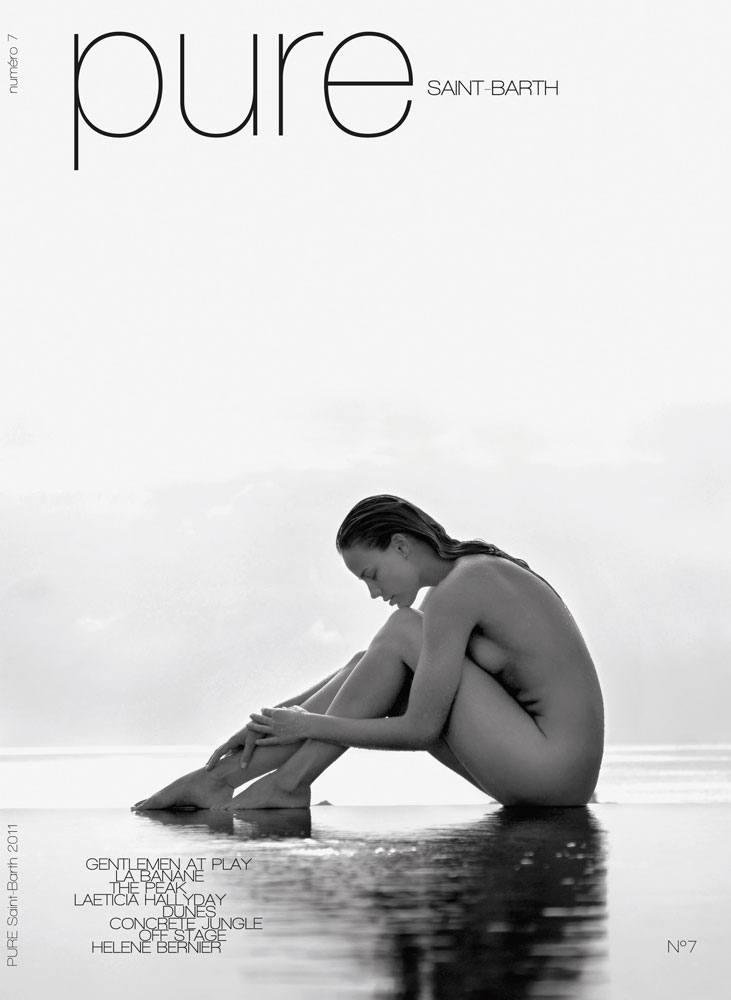
Interview with Helene Bernier
by Ellen Lampert-Greaux
When it comes to the defense of Saint Barthélemy, Helene Bernier is by far its best environmental protection agency. This soft-spoken 36-year old Saint Barth native is not afraid to fight for her convictions. She is savvy at using social media and makes use of Facebook to promote her non-profit organization, St Barth Essential, which worked closely with two other environmentally minded associations, St Barth Environnement and APO (association for the protection of birds), to spearhead a petition-signing campaign and mobilize the population to denounce —and stop at least for now— a major hotel project that would have destroyed Saline beach. If it weren’t for that petition, bulldozers might already be hard at work indelibly transforming one of the island’s most exquisite natural sites. She has pluck, courage, and determination and is not afraid to post telltale pictures of trash, construction debris, and old cars dumped inconsiderately around her island. For Hélène, the means justifies the goal: Protect Saint Barth.
When did you launch your company, Easy Time, and why?
Hélène Bernier: in 2002 when i was working at the Guanahani Hotel, guests were continually asking me about various activities and businesses, how to get to this or that spot, and about the different places to explore on the island. it occurred to me that there was a real need to help these tourists in their quest for specific information about Saint Barthélemy. That is why i decided to create easy Time. in 2005, after traveling through the Caribbean for several months, where every destination offered tour guides for its visitors, i realized there was a need for this service in Saint Barthélemy as well. This new activity, which did not exist until now, allows us to take visitors off the beaten track where they can discover the authentic side of Saint Barth.
When did you form the non-profit association, St Barth Essentiel, and what was the idea behind that?
HB: St Barth essentiel was launched in 2009 when a group formed on Facebook. The original goal was to “preserve the real Saint Barth,” so that Saint Barth does not lose its soul, and to protect its heritage: the traditional cottages, the old stone walls, the flora (gaiacs, cactus…), and fauna, etc. The association was hardly off the ground when we had to concentrate all of our energy in getting registered voters to sign a petition to protect the “green zones” in Saint Barth against the construction of new hotels (Saline, Toiny, Grand Cul de Sac…). While this petition met all the requirements of the law, the president of the territorial council did not present it to the entire council. We had to turn to the administrative court in order to have to it put on the agenda, as called for by the law. The goals of the association comprise the defense, transmission, and development of the historic, cultural, and environmental aspects of Saint Barthélemy, as well as its heritage. The association is very active in the organization of events, including training and informational workshops, and programs featuring scientists who are well respected in their various fields.
How did your interest in the environment develop?
HB: i love nature, and my island in particular. easy Time offers nature walks for guests and residents so that i can share my passion for Saint Barthélemy with them.But one day i saw a bulldozer in the process of destroying trees, including gaiacs (a species protected by ministerial decree), which played a big role in the history of Saint Barth as they used to build houses with the wood of these trees. There was no point in trying to talk to the guy operating the machinery, as he did not understand my anger and just went on about his job as if nothing was wrong. i said to myself, maybe if i can inform people about how important it is to protect the flora and fauna of Saint Barth, they could not claim ignorance and would react differently. As a result, there would be less deterioration of our ecosystem. That’s exactly why i started bringing scientists to the island, such as Felix Lurel, and why i organize field trips and lectures to educate the population about the richness of our environment. i continue to present various scientists and keep up the informational campaign.
Local politicians are always saying they support environmental protection… true or false? Do any local politicians belong to your association?
HB: environmental protection is a cause that every politician needs to have in his arsenal today. Certain defend this cause by conviction, others by obligation, and some haven’t taken any positive steps in this direction at all…! in Saint-Barthélemy, this conviction has never been very serious: if our politicians really wanted to protect the environment, they wouldn’t even entertain the idea of a hotel on the beach in Saline. They would have created a true environmental services office, and not simply a commission as part of the local council. i am waiting with impatience to read the report by the executive council on the issue of sustainable development in Saint Barthélemy, and the programs they envision to improve that situation. There is absolutely no official representative of the environmental commission on the executive council, which illustrates the lack of interest of our leaders in terms of this essential aspect of our lives. And yet it is a legal obligation in Saint Barth. The by-laws of our association do not allow political or religious members, and only one member of the territorial council has made a donation in their own name.
What do you think about the new industrial zone in Petite Saline?
HB: An industrial zone for such tasks as rock crushing and composting is definitely needed on the island. Obviously, the choice of a location for this zone is a real problem: it is also a shame that the work began while the zone in Petite Saline was still officially “green” and that it was changed into an industrial zone at the request of a private contractor. it seems more logical to me that to avoid the anarchy of uncontrolled dumping of construction debris on other sites, that the Collectivity should have explained the reasons for its choice in advance, rather than try and justify them after the fact. But i think that the intersection of Petite Saline and Saline is a strategic spot for tourists, and the presence of an industrial zone could rapidly transform it. The Collectivity quickly decided to use land that it owns in St Jean for the temporary stocking of plant debris, why not use the same land for rock crushing and composting?
What can be done to improve the environmental disaster in Grand Cul de Sac?
HB: The lagoon in Grand Cul de Sac was a magical spot where everybody liked to spend time with family or friends. Over time, the lagoon lost a lot of its beauty due to the large amount of building in the area. Additional construction and the pressure applied by the various nautical activities could cause harm to this marine park zone, and wipe out years of work dedicated to its protection. i am not a jurist or an architect, but it seems that this was a catastrophe in the making: a project to build a five-star luxury hotel with underground parking on the beach… totally illogical based on the location of the site and the nature of the land, which caused extra expense for the builders, and then the financial crisis put an end to it all anyway. Today, i think that the Collectivity has the means to impose that the site be restored, or at least improved with as little danger in terms of our health and wellbeing as possible. Why not purchase the project as-is, at a low price, and relieve the builder of his obligations, which clearly are a thorn in his side. Why not ask those who think we lack hotel rooms to invest here, rather than allow them to invest in “green” zones.
In your opinion, which sites are the most urgent to protect, and is this still possible?
HB: Yes it is always possible. The entire point of Colombier. The beach in Toiny. The area surrounding the beach in Saline. The five salt ponds that remain of the 12 that once existed. The grotto in Gouverneur. The beaches. More generally speaking: the green zones, the island’s natural heritage, the stone walls in Grand Fond that our visitors find so charming, the traditional cottages on the windward and leeward sides of the island. neighborhood chapels. Flora and fauna. The tradition of straw hats, patois, Creole… everything that defines Saint Barth as Saint Barth, and not simply a product of trendy over-consumption. What is natural is not superficial.
What would it take to truly protect the beaches and sites such as Toiny and Colombier?
HB: Taking into consideration the importance that these two beaches play in our landscape, with Toiny being the most undeveloped and dangerous beach on the island, and Colombier considered one of the most beautiful in the Caribbean, it would simply suffice for our elected politicians to classify both as zones never open to construction!
What can be done about the trash dumped everywhere and the construction debris left in the salt ponds…?
HB: in defense of the Collectivity, it must be said that we have noted a serious lack of education and good-citizenship on the part of certain residents of the island, as well as certain visitors. However, it seems to me that the Collectivity should do two things:
- Institute its own regulations, with enforcement of sanctions for those who flaunt the law;
- Having removed the communal containers for trash collection (which was not a bad idea), the Collectivity should make sure that the efforts of the trash collection services (public or private) are consistent as well as efficient, and provide maximum access to the trash treatment center in Public (major efforts have already been made in this domain).
How is it possible that people don’t have more respect for the island?
HB: When i was little, certain people in Grand Fond threw their bottles and cans into the ocean, and you can still see the results of this today. The older generations threw trash into nature or the sea for lack of an appropriate place to dispose of it… it’s hard to teach old dogs new tricks. There is an entire process needed to re-educate certain people. For others, it is simply a matter of ease or pure selfishness.
Why do you think it is so important not to build a hotel in Saline?
HB: Saint Barth lives from its tourism. Our tourists love Saline: it is one of the most popular beaches because it is undeveloped. All of the beaches on the island, except three — including Saline— have been developed. Does Saint Barth really need another hotel? if there really are important economic considerations, they must be established before sacrificing our natural treasures. it would be better to rejuvenate some of the existing hotels…!
Many tourists love the natural landscapes of Saint Barth, and hiking to such sites as ‘washing machine’ and Colombier. When the island gets over-built, what will they do?
HB: Go someplace else…
For you, what are the essential things the Collectivity could do to improve the environmental crisis?
HB: evolving from a municipality to a collectivity was an important step… especially now that we will almost certainly become a PTOM (Overseas Countries and Territories). it is now vital to push the PAUSE button, in terms of construction, if not, we are heading toward our own destruction… We need a real hospital with a maternity ward … in St Barth. establish a serious environmental service for the Collectivity. i am totally against the idea that the marine park can fill that need. The service should be created by— and serve— the Collectivity, allowing the marine park the freedom to play the role it was created to play. Create jobs and set up a system to examine flora and fauna at the airport and at the port to keep native species from leaving the island, and at the same time prevent invasive species from entering.
Can construction really be stopped on the island … there are a lot of young islanders who will want to build?
HB: Our politicians may be right when they say that an island, a territory, or a country that stops development, stand to lose traction. However, we should not sacrifice what is essential too rapidly, but make sure we understand what is really essential for the future, and our politicians should take a long-term view. in terms of what i see today, i ask myself if maybe we should favor building by young people and be more discerning when it comes to real-estate speculation.
To give a building permit for 8,000 square meters to an investor, yet refuse a small house for a young person is incomprehensible. Should we continue to give new permits to someone who already has 10 or 15 or 20 houses, while young couples cannot find a place to live?
The island’s traditional little cottages are disappearing little by little, often replaced by hotels or villas. Is there anything we can do to protect them?
HB: Other than common sense and a respect for our heritage, i don’t know if any legal means exists to protect the traditional cottages. But in the same way there are protected species of plants, why not also protect things built by man as well (landmarked, national registry, etc…). Unfortunately, i think that the owners of some of these cottages would object to such a project, as they are afraid they would lose the freedom to develop their land as they see fit, even to the detriment of our island’s history. i now belong to a heritage protection foundation, so maybe there is a way (as happens elsewhere) to obtain funds for the owners of the cottages to restore them, which in some cases might encourage them to do so, and in others is a real need!
How is it possible that there is construction debris stocked next to one of the most charming little cottages in Saline?
HB: Dumps and zones for industrial materials are, as far as i know, subject to specific legislation. The recurring problem in Saint Barth is not that there is a dump next to those pretty little cottages, which is aberrant to begin with, but that there is not an authorized place available. The fact that there is a dump next to a beautiful site that has been used to identify Saint Barth around the world, can only serve to tarnish the reputation of the island. To avoid this happening, the Collectivity should make these “unauthorized dumps” illegal and penalize their owners. As for those who complain that there is no place to park their machinery or dispose of their debris, they should envision the solution before they bring over-sized machinery onto the island or accept demolition projects.
This year, the Collectivity has started providing subsidies for solar water heaters and photovoltaic systems to create electricity… is this a step in the right direction?
HB: Of course, any stimulation for the use of new energies is a step in the right direction, especially in the case of photovoltaic cells and small wind turbines. But it seems to me that the Collectivity should set an example on its own buildings like the Hotel de la Collectivite or the airport. On the other hand, the aid offered by the Collectivity should not be construed as a tax-break for foreign investors on the island.
Have you ever been menaced because of your actions, or those of the association?
HB: Yes, when one is frank and tells the truth, that upsets some people, and ultimately you create enemies. But it’s better to be like that than be a hypocrite, or a simple “yes-man” like you see so often, sadly.
How do you envision the future of your island?
HB: By nature, i am an optimist, so i envision an island that remains beautiful, and maintains its reputation as the island where we feel totally safe… We have to protect the beauty of the island, the flora, the fauna, the beaches, and the quality of the air… the purity of what we breathe is very important. We have to listen to our elders in order to avoid making mistakes… they have the wisdom of experience. We have an international notoriety, and a history of being in contact with the outside world, to welcome outsiders… today new people are arriving who are very powerful and want to buy land and build on the island. To be able to adapt to all the changes to the island without losing our own identity… that would be fantastic!!!
This post is also available in: French
